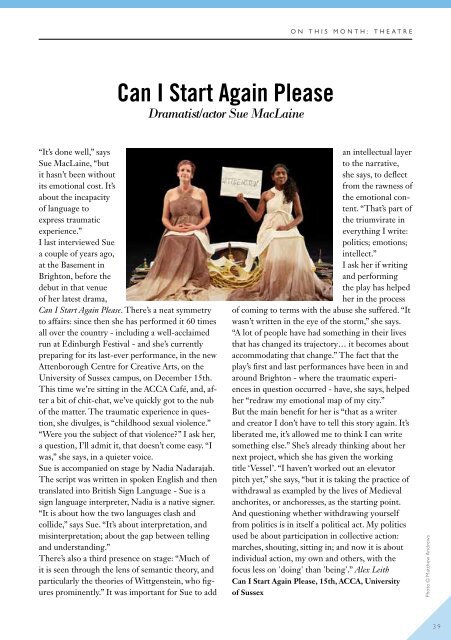Create successful ePaper yourself
Turn your PDF publications into a flip-book with our unique Google optimized e-Paper software.
ON THIS MONTH: THEATRE<br />
Can I Start Again Please<br />
Dramatist/actor Sue MacLaine<br />
“It’s done well,” says<br />
Sue MacLaine, “but<br />
it hasn’t been without<br />
its emotional cost. It’s<br />
about the incapacity<br />
of language to<br />
express traumatic<br />
experience.”<br />
I last interviewed Sue<br />
a couple of years ago,<br />
at the Basement in<br />
Brighton, before the<br />
debut in that venue<br />
of her latest drama,<br />
Can I Start Again Please. There’s a neat symmetry<br />
to affairs: since then she has performed it 60 times<br />
all over the country - including a well-acclaimed<br />
run at Edinburgh Festival - and she’s currently<br />
preparing for its last-ever performance, in the new<br />
Attenborough Centre for Creative Arts, on the<br />
University of Sussex campus, on <strong>December</strong> 15th.<br />
This time we’re sitting in the ACCA Café, and, after<br />
a bit of chit-chat, we’ve quickly got to the nub<br />
of the matter. The traumatic experience in question,<br />
she divulges, is “childhood sexual violence.”<br />
“Were you the subject of that violence?” I ask her,<br />
a question, I’ll admit it, that doesn’t come easy. “I<br />
was,” she says, in a quieter voice.<br />
Sue is accompanied on stage by Nadia Nadarajah.<br />
The script was written in spoken English and then<br />
translated into British Sign Language - Sue is a<br />
sign language interpreter, Nadia is a native signer.<br />
“It is about how the two languages clash and<br />
collide,” says Sue. “It’s about interpretation, and<br />
misinterpretation; about the gap between telling<br />
and understanding.”<br />
There’s also a third presence on stage: “Much of<br />
it is seen through the lens of semantic theory, and<br />
particularly the theories of Wittgenstein, who figures<br />
prominently.” It was important for Sue to add<br />
an intellectual layer<br />
to the narrative,<br />
she says, to deflect<br />
from the rawness of<br />
the emotional content.<br />
“That’s part of<br />
the triumvirate in<br />
everything I write:<br />
politics; emotions;<br />
intellect.”<br />
I ask her if writing<br />
and performing<br />
the play has helped<br />
her in the process<br />
of coming to terms with the abuse she suffered. “It<br />
wasn’t written in the eye of the storm,” she says.<br />
“A lot of people have had something in their lives<br />
that has changed its trajectory… it becomes about<br />
accommodating that change.” The fact that the<br />
play’s first and last performances have been in and<br />
around Brighton - where the traumatic experiences<br />
in question occurred - have, she says, helped<br />
her “redraw my emotional map of my city.”<br />
But the main benefit for her is “that as a writer<br />
and creator I don’t have to tell this story again. It’s<br />
liberated me, it’s allowed me to think I can write<br />
something else.” She’s already thinking about her<br />
next project, which she has given the working<br />
title ‘Vessel’. “I haven’t worked out an elevator<br />
pitch yet,” she says, “but it is taking the practice of<br />
withdrawal as exampled by the lives of Medieval<br />
anchorites, or anchoresses, as the starting point.<br />
And questioning whether withdrawing yourself<br />
from politics is in itself a political act. My politics<br />
used be about participation in collective action:<br />
marches, shouting, sitting in; and now it is about<br />
individual action, my own and others, with the<br />
focus less on 'doing' than 'being'.” Alex Leith<br />
Can I Start Again Please, 15th, ACCA, University<br />
of Sussex<br />
Photo © Matthew Andrews<br />
39


















